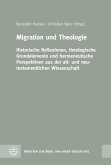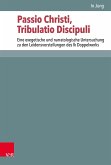Seit den Anfängen des Christentums bis heute ist das Leiden um des Glaubens willen Bestandteil christlicher Existenz. Die Studie erforscht anhand des Neuen Testaments die historischen Ursprünge von Verfolgung und fragt nach den Formen und Inhalten innerchristlicher Hilfe und Selbsthilfe. Der Autor zeigt auf, inwieweit das jeweilige Tun und Lassen aus neutestamentlicher Sicht gefordert, begründet, legitimiert, an Bedingungen geknüpft, begrenzt oder etwa kritisiert wird. Ermittelt werden neben den handlungsleitenden Motiven die dem Handeln zugrundeliegenden Normen und Werte. Auch klärt die Studie, inwieweit besagtes Handeln präskriptive oder paradigmatische Bedeutung haben kann. Die untersuchten Themen beinhalten Fragen zum Gebet, zu Flucht und Verstecken, materiellem und psychischem Beistand sowie zu Apologien und Rechtsmitteln, ebenso zu Gegengewalt und Gewaltverzicht sowie zur Bergung und Bestattung von Märtyrern.[Help and Self-Help for Persecuted Christians. A Study on New Testament Ethos]Christians have suffered persecution ever since Christianity began almost 2000 years ago. This study examines the historical origins within the New Testament, exploring the types and methods of assistance rendered within the Christian community. The author demonstrates from the New Testament to what extent certain actions or omissions are required, justified and legitimazed, or tied to certain conditions, limited to a degree, or in some cases criticized. In addition to the guiding motives, the norms and values underlying the actions are determined. This study also clarifies the extent to which such actions can have prescriptive or paradigmatic significance. The topics addressed include questions of prayer, escape and hiding, material and psychological support, as well as apologetics and legal recourse, the questions regarding counter-violence and the renunciation of such means, and discussions with respect to recovery of the mortal remains of martyrs and their burial.
Bitte wählen Sie Ihr Anliegen aus.
Rechnungen
Retourenschein anfordern
Bestellstatus
Storno








